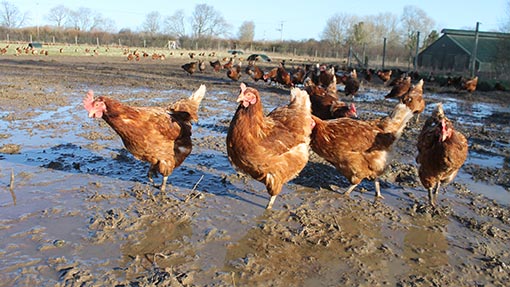Increasing worm threat to free-range layers

Free-range egg producers are being urged to revisit their worming programmes, following the wettest winter on record.
Mud provides the ideal environment for worms to survive, as their eggs don’t dry out. Once a worm infection is established, the whole environment will be contaminated, causing a serious burden on poultry health, even on birds that appear fit and healthy.
“In view of the extremely wet weather across the country recently, there is a high possibility during coming months of increased levels of worms and other pathogens on range areas,” said Alastair Johnston of Minster Vets.
“It is essential that free-range producers pay extra attention to their range management in order to minimise the risk of disease. Worm burdens can lead to reduced performance in terms of egg production and also reduced weight gain in young, growing birds.”
He recommends a stringent approach, with all free-range flocks routinely treated with flubendazole every six to eight weeks.
More on this: Coping with wet ranges
Stephen Lister of Crowshall Veterinary Services has also urged greater vigilance. “Worms multiply best when conditions are warm and wet. Historically winter has been a quiet time, but we are now experiencing worm problems in the normally quieter months.”
He suggests producers discuss the situation with their veterinary surgeons and adapt worming programmes accordingly. “This may mean a reduction in the time interval of worming in feed with Flubenvet Premix,” he said.
On farms with a proven heavy worm burden and high infection pressure, producers should target the parasite’s pre-patent period.
It’s also essential that all incoming birds are treated before entering the flock, and that ranges are kept as dry as possible.
